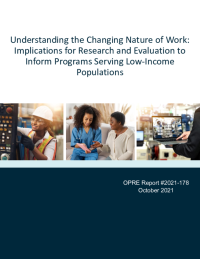Understanding the Changing Nature of Work
Implications for Research and Evaluation to Inform Programs Serving Low-Income Populations

 The Office of Planning, Research, and Evaluation (OPRE), within the Administration for Children and Families (ACF) at the U.S. Department of Health and Human Services, has a long history of supporting rigorous research and evaluation on the broad range of human services programs that fall under ACF’s auspices. Many of ACF’s programs have components aimed at supporting employment among low-income populations, and, consequently, OPRE regularly supports numerous evaluations of employment and training programs for low-income populations, which the office’s Division of Economic Independence oversees. Studies that OPRE sponsored played a key role in the policy debate surrounding welfare reform in the 1990s and since then have contributed to the large, growing body of research that informs policymakers and practitioners in designing and delivering programs to increase work and earnings among lowincome families.
The Office of Planning, Research, and Evaluation (OPRE), within the Administration for Children and Families (ACF) at the U.S. Department of Health and Human Services, has a long history of supporting rigorous research and evaluation on the broad range of human services programs that fall under ACF’s auspices. Many of ACF’s programs have components aimed at supporting employment among low-income populations, and, consequently, OPRE regularly supports numerous evaluations of employment and training programs for low-income populations, which the office’s Division of Economic Independence oversees. Studies that OPRE sponsored played a key role in the policy debate surrounding welfare reform in the 1990s and since then have contributed to the large, growing body of research that informs policymakers and practitioners in designing and delivering programs to increase work and earnings among lowincome families.
OPRE funded MEF Associates, in partnership with MDRC, to organize and facilitate a roundtable and prepare a series of white papers to explore future research topics related to employment and training programs for low-income populations. The first white paper built on those roundtable discussions, focused on a summary of research findings and knowledge gaps in the field, and highlighted a set of potential questions to guide ongoing research and evaluation efforts for OPRE, other federal agencies, and the broader field of researchers and practitioners. The second in the series, this paper discusses several ongoing trends in the labor market and their potential effects on the nature of work over the next 10 to 15 years for low-income populations. The trends are used to highlight potential questions to inform research and evaluation agendas on this topic. A final section discusses potential implications for labor market trends and ongoing research of the COVID-19 pandemic.
This white paper highlights several important trends in the labor market that continue to affect the nature of work. Some jobs likely will be eliminated by technology and automation, for example, but many of the remaining jobs will be changed in some way, with fewer routine and automatable tasks and more tasks requiring analytical, social, and creative skills. The abundance of job market data and methods to analyze these data will create the potential to better track emerging jobs and the skills they require. A small but growing number of individuals work in alternative arrangements, such as gig work or in jobs with uncertain schedules. Each of these factors will likely play out differently across regions of the country and for cities versus less urban areas. In addition, the COVID-19 pandemic has led to a dramatic increase in unemployment rates, an increase in telework, and reductions in financial wellbeing and physical and mental health.
Given these trends, the paper presents several potential research topics within each of the following program areas.
Job Search and Career Counseling
- Using data and technological advances to aid in job search, to identify declining and emerging occupations, and to identify jobs’ changing skills requirements.
- Using data and technology to identify jobseekers’ relevant skills and effectively demonstrate those skills to match individuals to potential employers.
- Understanding individuals’ use of alternative work arrangements and their effects on wellbeing and future employment.
Education and Training
- Using data and technological advances to stay abreast of jobs’ changing skills requirements, to inform skills requirements for training, and to support skills acquisition.
- Understanding the best way to help workers access training continuously over their careers.
- Exploring ways to increase digital literacy and to use technology to increase access to training.
- Using online learning tools to increase training completion.
Income, Reemployment, and Making Work Pay
- Exploring the best way to support workers who lose jobs, because of technology or other factors, via income support, retraining, and reemployment services.
- Exploring the best way to support workers earning low wages and individuals working outside the traditional employer-employee model, including gig workers and workers with uncertain and varying schedules.
Finally, although the COVID-19 pandemic’s long-term effects are difficult to predict, they have raised several areas for further research. For example, research can examine whether the pandemic has accelerated the trend toward job tasks automation, focusing on jobs with a high risk of viral transmission. The rise of telework can be explored, including its effects on lower-skilled workers and its effects on job task content. Finally, the relief policies enacted during the pandemic highlight the need for effective income and reemployment support.






